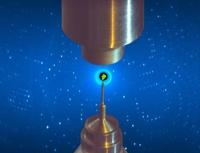Speaker
Description
Radioisotopes are an indispensable tool for diagnostics and therapy in nuclear medicine. As a rule of thumb, proton rich isotopes are most efficiently produced by accelerators, whereas neutron rich isotopes are more efficiently produced by neutron capture reactions. Here, we will focus on the latter process. Inherent to the purpose of nuclear medicine, most of these isotopes are short-lived and therefore cannot be produced on stock.
In the last 10 years, dramatic changes appeared in the supply and applications of these isotopes. Most notably, 99Mo99mTc, the most used isotope for nuclear diagnostic techniques, has suffered from unreliable supply. As the same process is utilized for the production of 131I, its supply is also hampered. On the other hand, isotopes like 177Lu used for targeted cancer therapy can now be produced carrier-free, thereby increasing its production efficiency and allowing hospitals to keep the unavoidable radioactive wastage to a minimum. Yet another application of increasing importance are poly-L-lactic (PLLA) microspheres containing radioactive 166Ho in the GBq range for selective internal radiation therapy of liver cancer.
The presentation will briefly discuss new routes towards minimizing radioactive waste for the production of radioisotopes and will give insight into very new applications of neutron-produced isotopes, such as the targeted therapy of up-to-now incurable metastases of prostate or neuroendocrine tumors.

